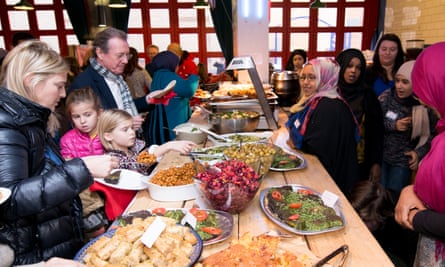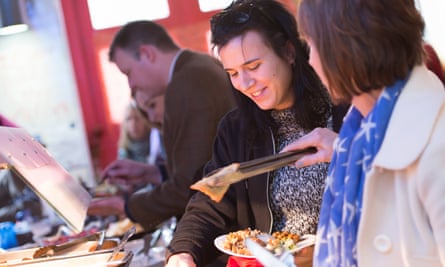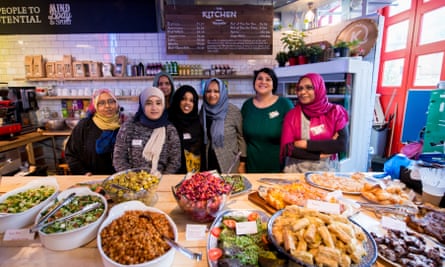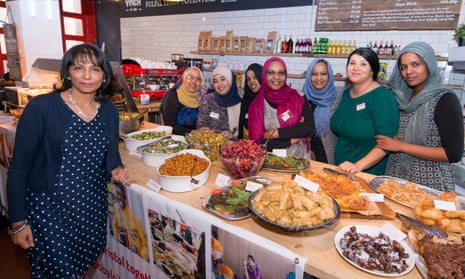I’m sitting looking at a colourful plate of food cooked by a group of Iranians, Russians, Eritreans, Sudanese and Somalis from the Refugee Women of Bristol initiative. I’m joined at lunch by Jamaicans, Australians and Poles. This is the International Peace Cafe, and there’s a special poignancy in this multicultural event in a week filled with violence and hatred around the world. The event was organised by the former BBC head of production Kalpna Woolf, who is convinced that food can build bridges as nothing else can.
Woolf founded an organisation in June called 91 ways, which refers to the 91 languages and dialects spoken in her home town. The International Peace Cafe, backed by Bristol city council and European money (Bristol is currently the 2015 European Green Capital), is a concrete expression of that. It is a place, as Woolf describes it, “for everyone to come and talk, to meet people from different backgrounds and hear their stories”.
“Food is a universal language that can bring people together,” she says, and 91ways is encouraging people to share their memories of family dishes and recording them. “We now have more than 120 [recipes] from many different communities, such as Susan from Syria, whose ful medamas (dried broad beans) recipe was a Friday ritual when her family gathered round the table after the men had gone to the mosque. Separated by the war, she knows those get-togethers will never happen again.”

In the Peace Cafe’s pop-up kitchen, Zahra, an Iranian-born community worker, is assembling a rice dish called adas polo with the help of local chef Freddy Bird. She layers fried onions and potatoes with fragrant rice and lentils spiced with cumin and cinnamon. Normally, the dish would have meat in it but as so many of the day’s clientele are vegetarian, it’s served instead with emerald green wedges of kookoo, a herby Iranian omelette. On the other side of the kitchen are piles of featherlight falafel made by Aza, who arrived from Sudan 13 years go. “She’s telling me I’m doing it all wrong,” says Bird, ruefully.
“Food is a great way of speaking to people,” says Woolf, whose family came from India. “When we share food, we share our national identity, our heritage and our culture. I often quote the story of my father who said: ‘When you eat with someone, you become a part of their memory and they become a part of yours.’”
Building on Bristol’s Food Connections, an annual event that started two years ago, 91ways has plans for pop-up peace cafes in different parts of the city, starting with Iranian and Syrian-themed menus. There are plans to create a book of food memories and recipes and an exhibition in the second half of 2016.
Woolf believes the initiative, like the recent Conflict Cafe pop-up in London, will resonate with any big city. “We are getting messages of support from around the UK. I think we are feeling the mood of people – they want to connect.

“We have heard stories of love, happiness, famiy, loss, war, conflict, health, what works in this city and what doesn’t. When people get together over food, they can talk about anything.
“What we are are trying to do is to get all the communities from Bristol connecting with each other to build greater understanding between groups who live in the city but don’t ever meet or move in the same social circles.”
What strikes me is that the cafe is spearheaded by women. Woolf is not surprised. “Women see the value of what we are doing. In many communities it is still traditional for them to be not only the cook of the family, but more socially active. They are great at brokering things. They tell me that they want to integrate so their children can be safe and won’t be forced to leave their adopted country. Many of the women also run small catering companies and this is a vital way for them to earn a bit of money and to work – something they generally struggle with due to language problems or the fact that their qualifications aren’t recognised.”

It seems like a model that other cities could usefully follow. Does your town or neighbourhood do anything like it?

Comments (…)
Sign in or create your Guardian account to join the discussion